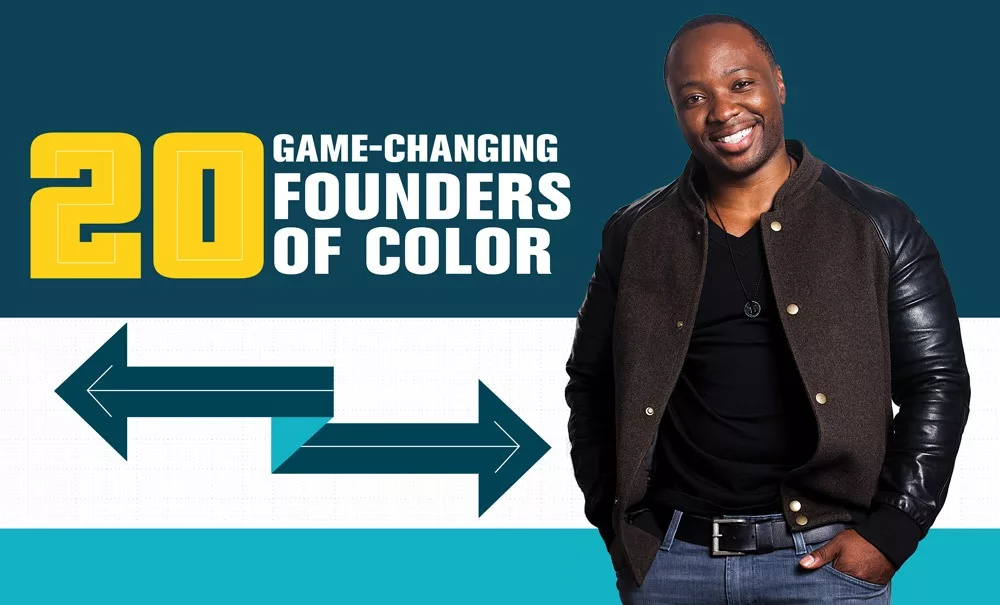If you still need convincing that power and racism are pebbles in our nation’s economic shoe, then try this on for size: in 2016 the Center for Global Policy Solutions reported that, due to discriminatory financing practices and a bias toward companies primarily operated by White males, the United States is missing out on having 1.1 million new minority-owned businesses and thus forgoing more than 9 million potential jobs and $300 billion in collective national income. Ouch. These numbers illustrate a massive missed opportunity for not only our country’s economic potential but also for the livelihood and self-determination of those who will comprise the majority of American citizens in as little as just two decades: people of color.
On top of the already impressive feat of starting businesses with these odds stacked against them, the tenacious founders of color featured here have committed their lives and businesses to addressing social and global issues related to racial equity, institutional racism, minority entrepreneurship, and access to fundamental resources and care. Without further ado, we present our inaugural list of Game-Changing Founders of Color — just a glimpse of the future economy.
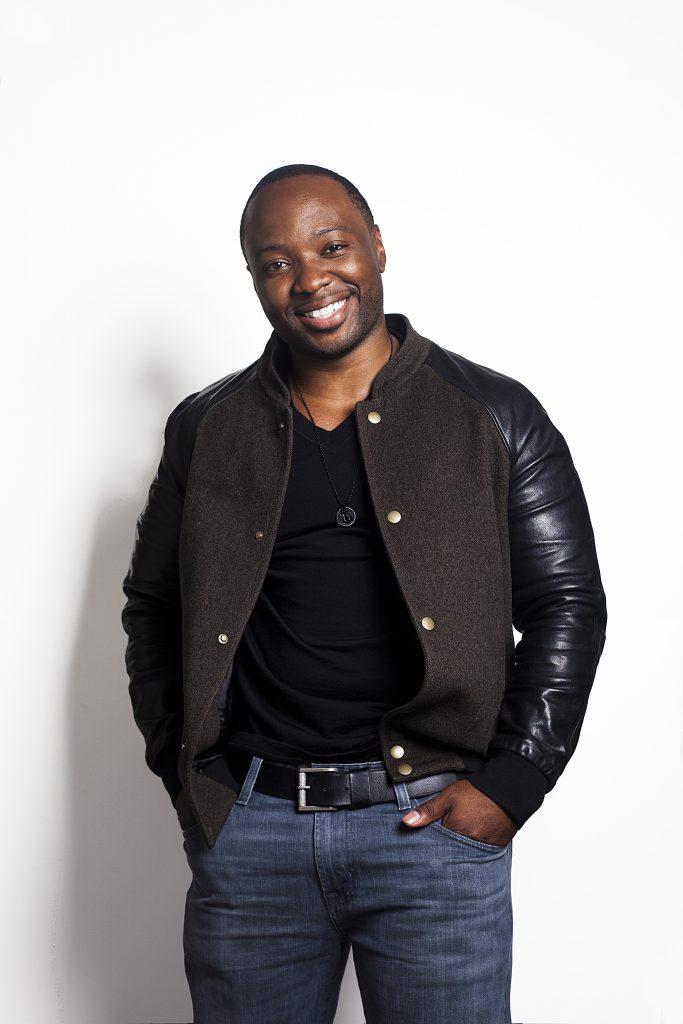
Photo courtesy of Frederick Hutson
1. FREDERICK HUTSON
Co-founder & CEO, Pigeonly
Las Vegas, Nevada
Frederick Hutson is a born entrepreneur. He launched and sold his first company, a window-tinting business, at the age of 19. At the age of 23, Hutson’s desire to attain the American dream led him down a less-than-stellar path, and he was indicted for distribution of marijuana. It was during his four-year federal prison sentence that he realized a need and an opportunity to impact the lives of people no one else was paying attention to: inmates.
In 2011, while Hutson was living in a halfway house in Tampa, Florida, he and co-founder Alfonzo Brooks launched Pigeonly, a low-cost communication platform that makes it easy for people to connect with and support an incarcerated loved one. Its technology cuts the cost of expensive prison calls by 80 percent and allows people to send their inmate photos, greeting cards, and other communication directly from a cellphone, tablet, or computer. After collecting mounds of research and educating themselves, Hutson and Brooks applied to multiple accelerators to nudge Pigeonly into flight but were accepted by only one: NewMe, a Silicon Valley-based accelerator for underrepresented minorities. At the end of that program the duo had successfully raised their first million.
With subscribers in over 88 countries, Pigeonly processes roughly 2 million calls a month, more than any other provider, and has saved inmates and their families well over $10 million in phone calls alone. Hutson and Brooks lead a growing team of more than 25 people and have raised more than $5 million in funding.
What role should business play in advancing racial equity?
“A lot of our issues right now could be addressed by building companies. There’s a whole world of issues that business can address, like simply making poverty less expensive. Whether it’s cashing a check without having to go to a check-cashing spot or finding car insurance that’s actually affordable, there are so many business opportunities that can solve social problems. And people who come from diverse backgrounds could build those businesses — founders who not only understand the problem they’re aiming to solve but who also deeply understand the market they’re serving.”
What gives you hope for the future?
“One of the things that’s giving me hope is that there are other people building businesses the criminal justice system. In the beginning, we were like a lone tree, whereas now there are other trees around. Even on the political side across party lines, we’re seeing agreement that the justice system does need reform.”
SEE Hutson speak at the 2019 Conscious Company Leaders Forum.
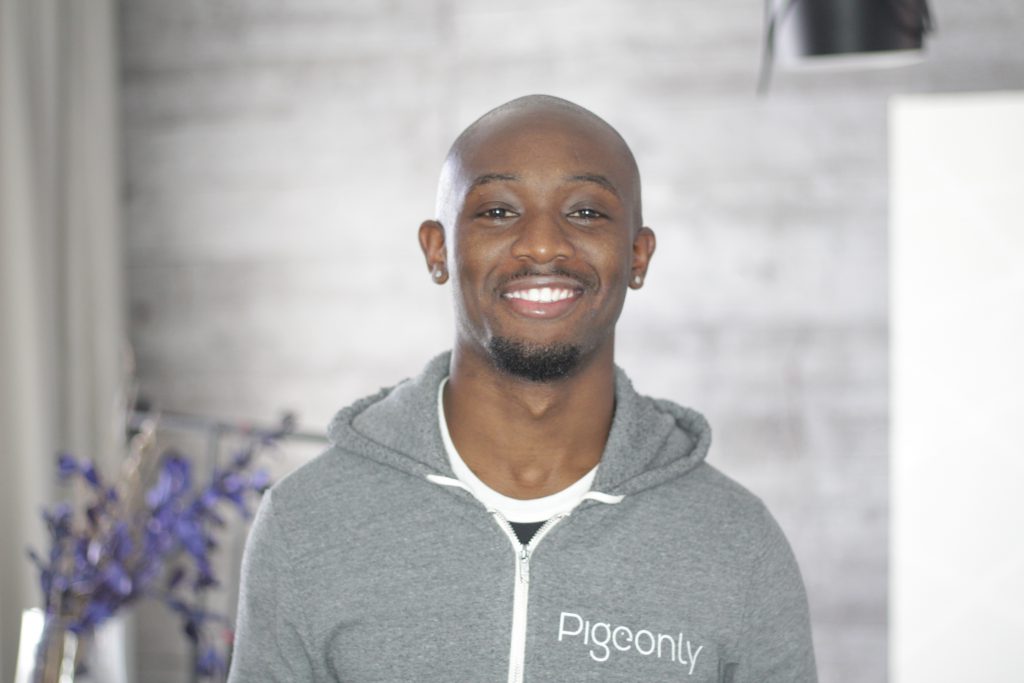
Photo by Meisha Hall
2. ALFONZO BROOKS
Co-founder & Chief Fulfillment and Logistics Officer, Pigeonly
Las Vegas, Nevada
After serving for six years in the Air Force, Alfonzo Brooks decided it was time to take his leadership skills and do what his father and grandmother had done before him: start his own business. After purchasing a few franchises, Brooks enrolled in college in St. Petersburg, Florida, near his hometown of Tampa. While there, the stars aligned when he reconnected with his friend Frederick Hutson, who had recently been released from prison and was developing a new business idea while living in a Tampa halfway house. With his entrepreneurial spirit ignited, Brooks dropped out of school and teamed up with Hutson to create the inmate-communication platform Pigeonly. He hasn’t looked back since.
What is the most important social issue you’re addressing?
“The biggest issue we are addressing is recidivism. Offenders are less likely to repeat when they have constant communication with their support system. Pigeonly gives them those communication channels to stay connected. We make it easy to use and very affordable. There are over 2 million people incarcerated at the moment, and the majority of those people will transition back into society. Our products help them make that transition in hopes that they can have quality, fulfilling lives going forward.”
Advice for social entrepreneurs of color:
“Hustle. Don’t expect anything to come easily. Educate yourself to put yourself in the best possible positions. Remain humble, and take care of yourself physically, emotionally, and spiritually.”
What gives you hope for the future?
“Waking up every day being grateful for the opportunity to be a better man and impact the world. If I take advantage of each day, I know I will be fulfilling my purpose in life.”

Photo courtesy of Kelly Burton
3. KELLY BURTON
Founder & Principal, Nexus Research Group
Founder & CEO, Founders of Color
Atlanta, Georgia
At a young age, Kelly Burton realized that where you’re born matters. When she was 12, her family moved from Camden, an underinvested community outside of Philadelphia, to the suburbs so that she could attend better schools. She quickly became aware of the gross resource disparity between the two communities and wanted to contribute to improving the conditions and increasing opportunities for other children who didn’t have the same means her family had.
After graduating from Emory with a doctorate in political science, Burton did some consulting before taking the leap in 2009 to found Nexus Research Group (NRG), a strategic advisement firm that provides consulting services to corporations, foundations, and government agencies looking to create measurable positive impact on social issues like criminal justice, economic development, affordable housing, youth development, and education reform. NRG addresses these issues with an understanding of the complexity of achieving social change and the ways that issues intersect to create seemingly intractable problems.
In 2017, Burton launched Founders of Color, an online platform connecting minority entrepreneurs with high growth potential to the information, relationships, and opportunities they need to scale quickly, while simultaneously connecting those looking to access minority founders with the data, information, and support they need to navigate the minority-entrepreneur landscape.
What role should business play in advancing racial equity?
“Racial equity is about helping people of color catch up after 300 years of being virtually excluded from mainstream markets. If you’re not talking about dedicating disproportionate resources to Black and Brown people in a way that might enable them to close a gap 300 years in the making, then you’re not talking about equity at all.”

Photo by Tomas Quiñones-Riegos
4. YSCAIRA JIMENEZ
Founder & CEO, LaborX
Cambridge, Massachusetts
Say hello to a hiring revolution devoted to reducing the stigma of not having a four-year degree. After arriving in the US as the youngest of five children in a Dominican immigrant family, Yscaira Jimenez witnessed her older brother’s struggle to land a stable living-wage job despite his having an important skill set and strong desire to provide for his family. Jimenez decided she would pursue a career in education to help people like her brother graduate from high school and college and go on to find gainful employment. In 2018, she launched an online talent marketplace, LaborX, to connect the nation’s diverse and untapped workforce with innovative employers. In the company’s own words, “It’s the LinkedIn for the linked out.”
Jimenez isn’t new to the startup scene and is no stranger to hiring. She founded La Pregunta Arts Cafe in Harlem and worked for three New York-based education startups (Rocket Learning, Learn It Systems, and Platform Learning) in business development, operations, and corporate trainer roles, bringing tutoring to more than 10,000 low-income students across the US. Despite being hired at a time when she did not have an MBA, Jimenez outperformed her colleagues who did, and she kept this in mind when assembling teams of her own, hiring people based on their skills and abilities rather than on where they went to school or whether they had four-year degrees. This approach, along with the fact that almost two-thirds of the American workforce do not have four-year degrees, was the professional impetus for founding LaborX and is apparent in the company’s mission: to connect companies that are looking to expand their talent pipeline to skilled workforce members who may lack an elite pedigree or strong social capital. LaborX partners with resources like the City and County of San Francisco and the TechSF initiative to find diverse, untapped talent graduating from alternative education sources such as boot camps, vocational partnership programs, and community colleges.
What is the business case for tapping into this underrepresented workforce?
“Don’t take it from me; the research has been done by McKinsey and Harvard. Diverse teams outperform more homogenous teams. Outperforming teams lead to companies that perform better financially. They also tend to improve morale, which then leads to higher retention, which affects a company’s bottom line. Also, when your company has a diverse client base, you want employees who represent that client base, who might cover someone else’s blind spot when designing products, for example.”
What gives you hope for the future?
“Being out here in the trenches working with our partners, pushing the vision for apprenticeships not just in traditionally blue-collar industries but in the knowledge economy. It’s going to be a long time before college becomes affordable for all, so these providers and alternatives are supporting low-opportunity but high-potential candidates. Seeing more of those partnerships materialize gives me hope.”
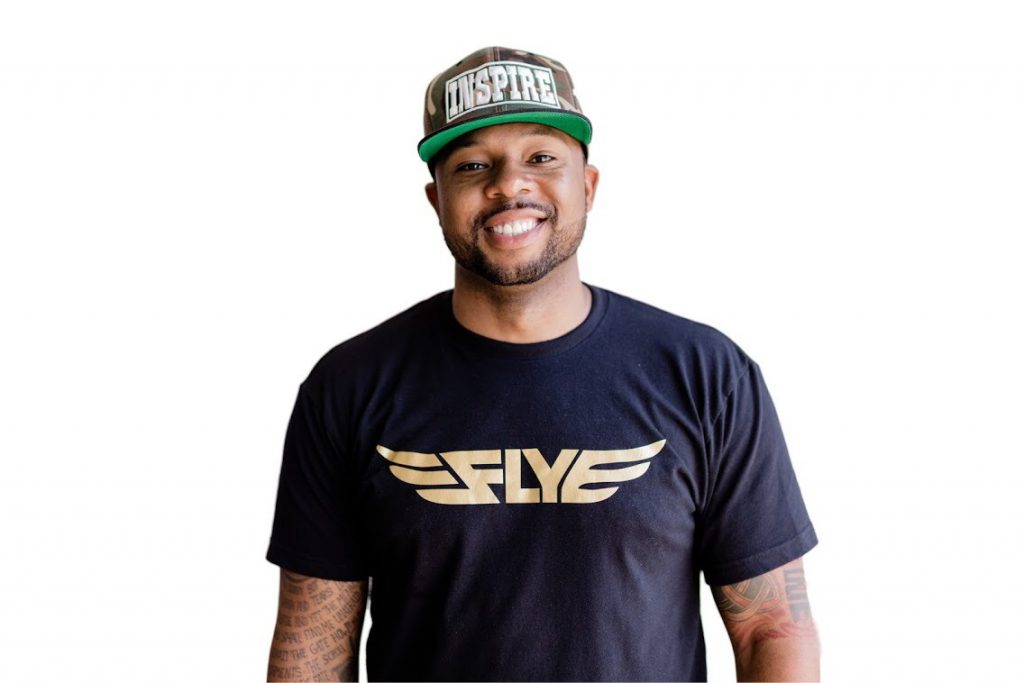
Photo courtesy of Grange Enterprises
5. CORTNI GRANGE
Founder, Grange Enterprises
Alexandria, Virginia
Cortni Grange remembers his aha moment like it was yesterday. He was holding his newborn son after yet another stint at a corporate sales job where he was “crushing it but dead on the inside.” Peering into his son’s eyes, Grange realized he was operating with three mentalities: a fear of the unknown, a lack of faith, and an expectation of finding inspiration in uninspired places. Soon after, he read “The Power of Silence” by Carlos Castaneda and realized his mission: connectivity. He founded Grange Enterprises, a legacy of three generations of Grange family businesses. Grange Enterprises comprises Grange Family Estate (Linstead, Jamaica), Grange Property Management (Hartford, Connecticut), and Grange Strategy (Washington, DC). Through Grange Strategy, Grange has worked with over 5,000 youth, supported over 1,000 young adults in developing their career paths, impacted over 10,000 people through speaking and workshop facilitation, and provided business guidance to the tune of more than $5 million in funding and capital in under five years.
What is the most important social issue you’re addressing?
“There are so many Band-Aids for crises; my work is not centered on a specific social issue or cause but more so on the roots to those issues and causes. While in some ways we are more connected than ever , I deeply believe that our society’s biggest misalignment is a lack of connectivity. Whether someone is starting a business, developing the next great world leaders, searching for balance in their intimate relationships, or looking to build sounder societies, connectivity is the essential ingredient to success, happiness, and fulfillment.”
Advice for social entrepreneurs of color:
“Do not forget that business is about making money. I made the mistake early of thinking that making a difference would eventually lead to making money, but that is not always the case. Rather, making money will always allow you to make a difference if your moral compass points in the right direction. There’s a TED Talk by Dan Pallotta called ‘The Way We Think About Charity is Dead Wrong.’ I suggest watching it and studying it before you start a any social venture.”

Photo by Toni Riales
6. JESSICA NORWOOD
Founder, The Runway Project
Prichard, Alabama
Jessica Norwood views money as medicine that can heal the wounds communities suffer from disasters or institutional failures. She hails from a small neighborhood three miles north of downtown Mobile, Alabama, colloquially called Africatown because it was formed by a group of West Africans who in 1860 were included in the last known illegal shipment of slaves to the US; Norwood’s father was once the mayor. While she grew up with a deep understanding of systemic racism, it was not until Hurricane Katrina hit the Gulf Coast in 2005 that she realized how acute a system-wide failure could be for those without financial resources. That experience inspired the former political fundraiser and consultant to create the Emerging ChangeMakers Network, which since 2007 has identified up-and-coming leaders and connected them to issues, ideas, people, and organizations that can make a significant impact in traditionally marginalized communities.
Driven by the understanding that investing in Black entrepreneurship is a pivotal way to create resilient, racially equitable communities and a robust economy, Norwood went on to found The Runway Project in 2016. The initiative aims to bridge the $19,000 gap between the net worth of the average Black household and the $30,000 needed to start a business from scratch. The organization partners with values-aligned financial institutions and offers a five-year certificate of deposit to create a dedicated pool of capital for loans to Black business owners, mimicking the friends-and-family pre-seed money common to most startups and yet so often unavailable to Black entrepreneurs. The loans come with low interest rates and high-touch support like facilitated mentoring and peer-to-peer coaching. In essence, Norwood enables the community to become the entrepreneurs’ friends and family. “While we each may not have a lot,” she says, “together we have plenty.”
What makes you most proud of your work?
“Inside of the racial wealth gap is the worst thing you can imagine; that gap incorporates and encompasses slavery and prejudice. There is pain and trauma involved in that. When I’m talking to these borrowers who live in a world that doesn’t believe in them, that doesn’t find them valuable or necessary — it’s like a therapy session. What we’re doing is making money into medicine, healing, making it so that everybody — no matter where you are, who you are, or what you have — can participate in helping another human out of some of the most traumatic things that have happened in the history of this country.”
Advice for social entrepreneurs of color:
“Keep pushing for what you know is right. The way this system is currently set up, it will not notice your full value and worth. The system does not honor what your worth is; you have to know your worth and then tell them what your worth is. Do not be discouraged, but take this as an opportunity to never let people who don’t know you or who don’t fully see you tell you what your value is.”
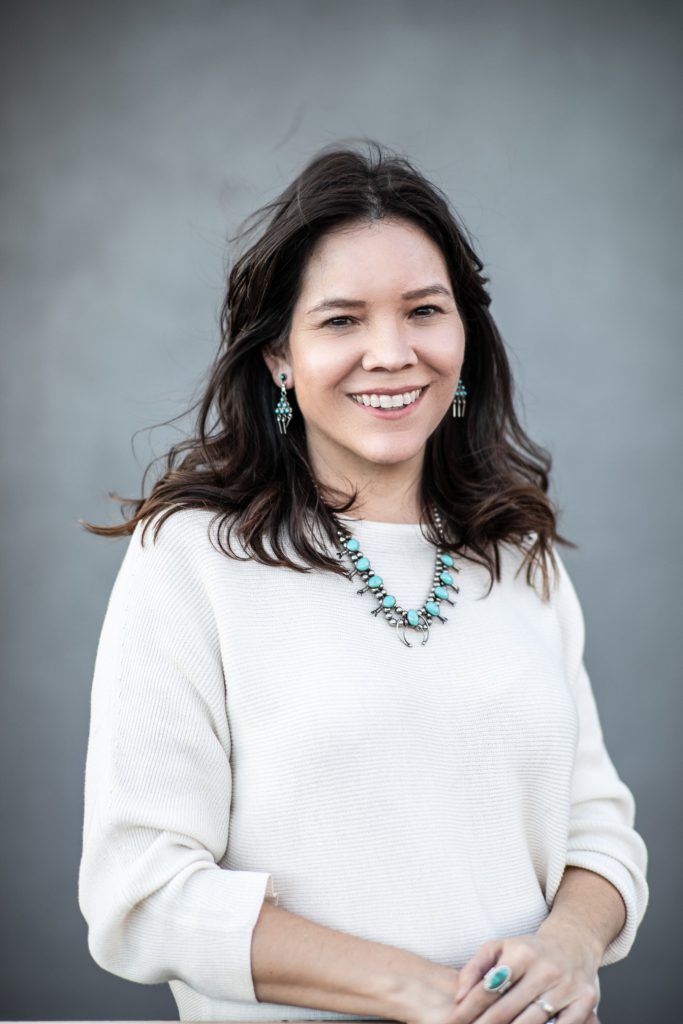
Photo by Raymond Chee
7. HEATHER FLEMING
Co-founder & Executive Director, Change Labs
Principal, Catapult Design
Tuba City, Navajo Nation
Heather Fleming is dedicated to promoting local, sustainable, and culturally relevant entrepreneurship in the Navajo Nation. When she left Vanderwagen, New Mexico (a rural community on the border of the Navajo Nation), to attend Stanford University, Fleming quickly became aware of the stark contrast between the two communities. While the entrepreneurial energy in Silicon Valley is palpable, the concept of new business on the reservation is anything but. While in San Francisco, Fleming co-founded Catapult Design, a product and process design firm that supports social entrepreneurs in more than 17 countries, and served as the company’s CEO for 10 years.
In 2013, inspired by her work at Catapult and her upbringing on the reservation, Fleming secured her first National Endowment for the Arts grant to run an entrepreneurship and innovation event in the Navajo Nation. She was introduced to Jessica Stago, who at the time was helping the Grand Canyon Trust (GCT) establish a virtual business incubator for Native small businesses, and the duo joined forces to co-found Change Labs. With the help of the GCT, what began as a multi-year event has evolved into a nonprofit organization that supports and addresses the unique challenges faced by Navajo entrepreneurs. In late 2019, Change Labs will open its 4,000-square-foot co-working space and business incubator in Tuba City, Arizona, dedicated to enabling Native American-owned startups and small businesses to thrive.
What are the unique challenges faced by Navajo entrepreneurs?
“The Economist called the Navajo Nation ‘capitalism’s last frontier,’ and I completely agree. You just can’t find a place with a more caustic business regulatory environment than on Navajo. Every dollar that’s earned on the reservation is most often being spent in our border towns, which are entirely prosperous, but because the Navajo Nation lacks small businesses and any sort of local and sustainable economy, you just don’t see change happening there. It’s extremely bureaucratic, and when the tribe thinks about economic development, their solutions are casinos or coal-fired power plants. Yes, they’re creating a handful of jobs, but those jobs do nothing to address the severe brain drain that’s happening on the reservation. I do not want to use my Stanford education to work at a casino or employ people at a coal plant. I feel like the tribe is missing its mark and disabling itself by creating processes and policies that stifle change.
We have an estimated 50 percent unemployment rate, and that’s because most of our transactions on the reservation happen in the informal economy. We have a thriving flea market culture, but those are informal businesses; they’re not registered because of all the hurdles Native entrepreneurs based on tribal land have to deal with. These hurdles can be relatively minor, like access to Wi-Fi, a computer, or a printer, which anyone
in an urban area can take for granted because they probably have a library or somewhere they can go to access these things. To add insult to injury, only 18 percent of our roads are paved and Navajo doesn’t have any retail infrastructure for people to create brick-and-mortar businesses. Almost everybody is forced to run their businesses from their homes. Since tribal government doesn’t own tribal land — the federal government leases it — each household on the reservation gets a one-acre allotment of land called a home-site lease. To own a registered home-run business, you have to go through the steps to convert your home-site lease to a business-site lease. Once you convert your home-site lease to a business-site lease, there’s no guarantee that you can necessarily reverse it. So if you forfeit your business, you may forfeit your land. It is an extremely scary risk for any entrepreneur: in order to create your business (and your livelihood), you may one day have to forfeit the only bit of land that you own.
For anyone who wants to get a business-site lease off of their home-site lease, while the tribe says it’s a one-year process, what we’ve witnessed from the entrepreneurs that we work with is that it’s a two- to three-year process. I can’t imagine being told, when I was creating Catapult Design, that I could start the process now but I wouldn’t have a business until three years from now. When I registered Catapult, I did it within two days at a downtown office in San Francisco. On Navajo, it’s a 30-day registration and a multi-year business-valuation process, and the business site leasing process includes around 63 steps. It requires a number of fees and even a signature from the president of the Navajo Nation — it’s pretty insane what they expect an entrepreneur from a small community to be able to do in order to start a business. Most of Catapult’s clients in East Africa and India are doing work in extremely resource-constrained communities that one could compare to the Navajo nation, and yet I feel like an entrepreneur in the middle of rural Kenya could probably create, fund, and run a new business easier than one could on Navajo.”
What gives you hope for the future?
“Despite all of these hardships, have not lost hope that one day they’re going to have a thriving business. People have so many great motivations for what they’re doing, and none of them involve greed or money; it’s always about trying to provide strong financial futures so their kids can go to school, or solving a social issue in their community. I find it all extremely inspirational, and I want to support it.”
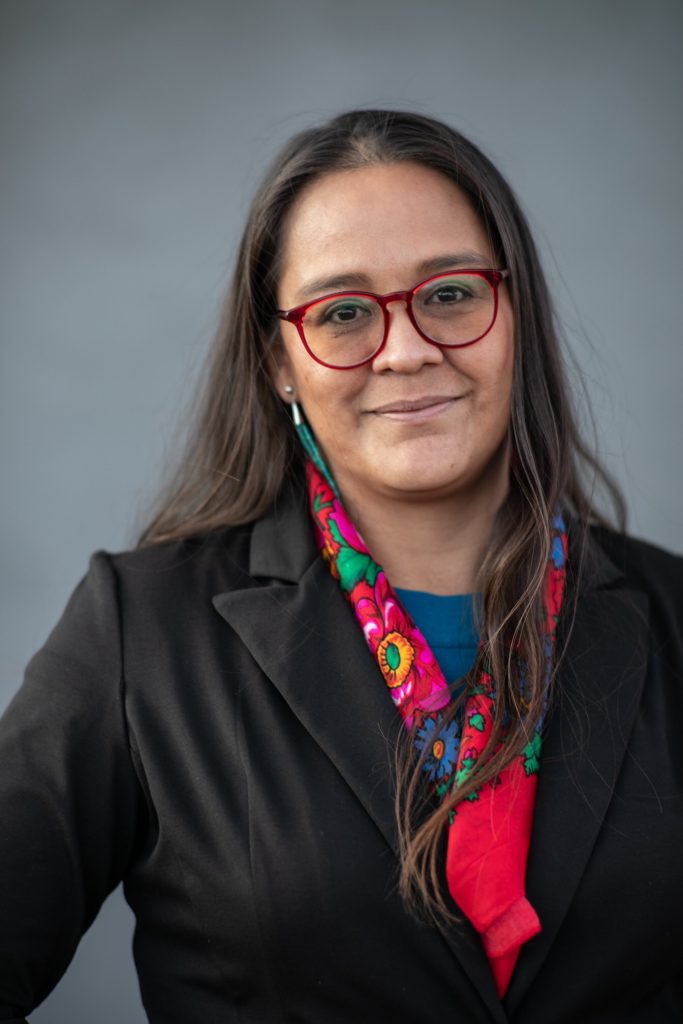
Photo by Raymond Chee
8. JESSICA STAGO
Co-founder, Change Labs
Change Labs Project Director, Grand Canyon Trust
Tuba City, Navajo Nation
Jessica Stago describes building a business on the reservation as similar to trying to swim with one leg and one arm tied together. Having grown up in a family of silversmiths who considered themselves “just the providers of a product” rather than business owners, Stago realized that she was surrounded by entrepreneurship in the Navajo Nation and yet nobody was talking about it. She became a passionate ally for Native startups, honing an extensive background in business counseling and business management on the Navajo Nation. While working for the Grand Canyon Trust, Stago joined Heather Fleming to co-found Change Labs, formerly known as the Native American Business Incubator Network. Stago serves as the director of business incubation and handpicks mentors for the program.
What role should business play in advancing racial equity?
“This systemic change needs to consider that Native people want to build businesses in their own communities because they want to live a better life on the land they are part of and to pass on that option to their children. It’s not about building wealth in the same sense that most Americans understand it. This has implications in areas such as access to capital. When capital is only available based on return-on-investment structures, access will never reach people who don’t value the same things.”

Photo courtesy of Kezia Williams
9. KEZIA WILLIAMS
Founder & CEO, The Black upStart
Washington, DC
Something clicked for Kezia Williams when she was introduced to Malcolm X’s speech “The Ballot or the Bullet” in a political theory course. A fresh narrative rooted in self-empowerment ignited in Williams an unapologetic love for herself and her Black community. She acted on this newfound fervor by starting a campus chapter of the NAACP to create a safer space for Black undergrads, launching a grant-making nonprofit funded by the charitable contributions of young Black philanthropists, and founding The Black upStart, a bootcamp designed to teach Black entrepreneurs how to overcome startup obstacles specific to race and create successful, profitable businesses.
The Black upStart launched in 2016 with an expectation of attracting 40 applicants for 20 open spots; 110 people applied in one week, and one month later Williams welcomed her first cohort of 20 entrepreneurs. To date, The Black upStart has trained 250 Black founders of early-stage, pre-revenue businesses in six markets (Raleigh, Durham, Charlotte, DC, Baltimore, Brooklyn, and Atlanta). Forty-one percent of those ventures are still in business; at least half of them are now also employers.
What is the most important social issue you’re addressing?
“Black people not only need more jobs, but also more Black job-creators. The Black upStart is committed to increasing the number of Black employers who are more likely to hire Black employees and use their revenue to invest in Black communities. When we invest in Black business-owners, the returns have a generational multiplier effect.”
Advice for social entrepreneurs of color:
“The biggest challenge affecting Black entrepreneurs is their dysfunctional relationship with Black consumers and their disinterest in creating enterprises that benefit from Black consumers’ $1.2 trillion annual buying power. We must reorient aspiring Black business-owners to the benefits of selling products and services that are disproportionately purchased at higher numbers by Black consumers — outside of the familiar hair salon and barbershop. When I read reports such as ‘Black Impact: Consumer Categories Where African Americans Move Markets,’ detailing a list of 17 consumer categories where we are over index in spending, I’m flabbergasted at the deficit of Black entrepreneurs who sell products in these categories. For example, True Laundry Detergent is the only Black-owned company selling detergent despite Blacks spending $407.8 million annually on household cleaning products.”
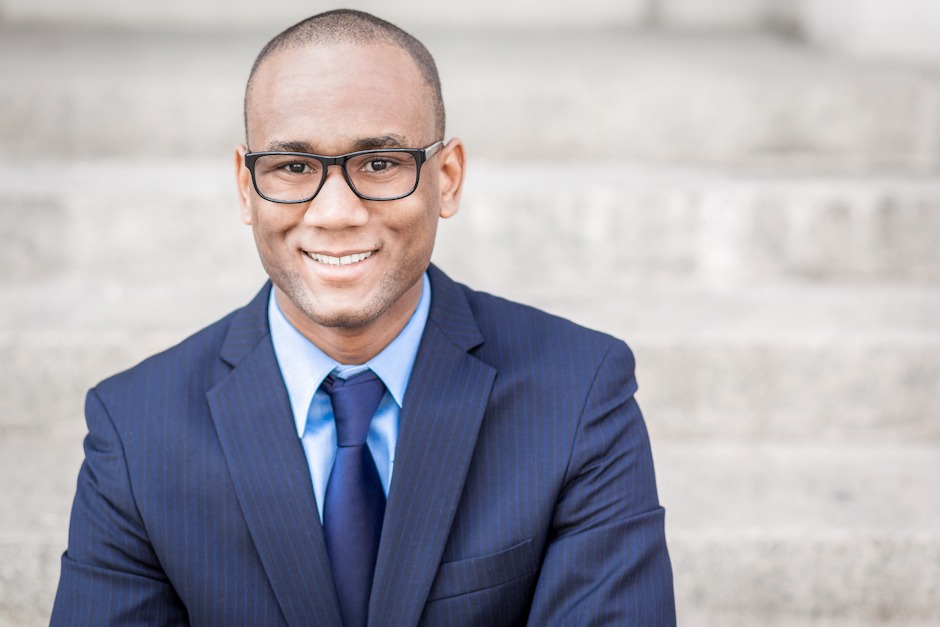
Photo courtesy of CariClub
10. RHODEN MONROSE
Founder & CEO, CariClub
New York City, New York
Rhoden Monrose is changing the way that the Fortune 500 give back. The former finance pro grew up in Harlem after emigrating from Saint Lucia at the age of 12. With the help of nonprofit organizations, he attended Middlesex School before earning a scholarship to Trinity College. Upon graduating, he began his career as a derivatives trader, but he couldn’t shake the feeling that something was missing. In 2011 he joined a circle of like-minded people who found purpose in using their time, talent, and money to make a positive social impact. It was this involvement along with his personal experience with nonprofits that led Monrose to found CariClub, a for-profit company living between big business and the nonprofit sector.
Launched in 2016, CariClub is an online network that matches young professionals to philanthropic boards. Young professionals gain leadership experience while contributing time, and often money, to serving on an associate board helping to operate a nonprofit they might not have otherwise known about. To date, CariClub’s members have raised $25 million for various nonprofits. In addition to enabling young professionals to give back to missions they care about, CariClub also offers their corporate partners — which include Morgan Stanley, Deloitte, Unilever, Citigroup, and Davis Polk — the ability to help their teams hone leadership skills, increase employee retention, and enable networking through these nonprofit partnerships.
What role should business play in advancing racial equity?
“It’s important for business leaders to continue to hire as diversely as possible, and to look for talent in unexpected places. While certainly improved and continues to improve every day, it’s critical for business leaders to make the commitment to hire a diverse workforce and to prioritize mentorship and meetings with young entrepreneurs and professionals of color who want to learn.”
What gives you hope for the future?
“The Millennial and future generations give me hope. We see it daily at CariClub: countless young people get involved through our platform or lobby their own companies to enroll in the program so that they can participate. The desire to give back, the desire to create a better world, makes me incredibly optimistic.”

Photo by Tony Powell
11. DR. XIMENA HARTSOCK
Co-founder & President, Phone2Action
Alexandria, Virginia
Having been a school principal and assistant superintendent of schools in DC, Dr. Ximena Hartsock has been involved in education advocacy campaigns since she was a teen in Chile, but she stumbled upon the tech industry by accident. While she was working as Director of Grassroots Advocacy for an education organization in 2012, Hartsock recognized a technology gap in advocacy highlighted by a significant trend that year: the adoption of smartphones rose from 30 percent to 45 percent. Tasked with mobilizing parents and teachers to contact and visit lawmakers, Hartsock saw an opportunity to communicate through email and social media on smartphones. The idea for Phone2Action, an app to connect constituents with their officials in order to influence public policy, was born.
When Hartsock and co-founder Jeb Ory launched Phone2Action in 2013, there was nothing like it on the market. Today, 11 million people use the platform to reach lawmakers across the US and abroad. Since 2013, Phone2Action has sent lawmakers 43 million messages from constituents, and in 2018 the app sent messages to 19,000 officials.
What is the most important social issue you’re addressing?
“Lawmakers exist to represent people in the creation of laws and regulations. We always think of Congress, but lots of changes happen at the local level, by governors, mayors, state lawmakers, city councils, ANC commissioners, committees — the list goes on. These legislators make decisions that have an impact on every aspect of our lives and too often without any input from those who put them in office. It is extremely important for people to have a way to connect with their officials and share how they feel about issues. It is a very exciting time in the US where ‘marching is the new brunch’ and civic technology is democratizing policymaking.”
Advice for social entrepreneurs of color:
“We hear a lot about the lack of diversity in tech entrepreneurship, but I can’t think of a better time for a person of color to start a company. There is capital available and desire by the venture capital community to invest in us because of the criticism they have received for the lack of funding going to minorities. However, the type of entrepreneur that is going to succeed now is different than a decade ago, so we need to stop emulating and glorifying Silicon Valley. If you are thinking about starting a company, I suggest you read Gary Shapiro’s latest book, ‘Ninja Future.’ In the book, Shapiro talks about the new type of entrepreneur our world needs — one that is bold, compassionate, resilient, and embraces diversity and collaboration.”

Photo courtesy of Tricia Martinez
12. TRICIA MARTINEZ
Founder & CEO, Wala
Cape Town, South Africa
With a background in behavioral economics and policy, as well as her experience as a Mexican woman building a business in Africa, tech entrepreneur Tricia Martinez knows firsthand just how much value there is in considering diverse perspectives. The first company she started out of graduate school — providing Ugandan farmers with unconditional cash transfers, one of the only proven interventions for alleviating extreme poverty — deepened her knowledge of how markets, societies, and individuals function. A light bulb went off: over half the global population operates outside of the formal financial system not because of barriers to education but because the system was never designed to service the vast majority.
Driven by a strong belief that financial services are a human right, Martinez founded Wala, a blockchain-powered financial services platform with a mission of creating a just and accessible financial system where everyone can participate and prosper. The app enables greater levels of economic participation from emerging markets by making financial services more accessible and removing fees. Wala is the launch partner of Dala, an open-source multi-chain crypto-asset designed for emerging markets, the first major contributor to Dala’s open-source development, and the first application enabling the use of Dala for transactions and peer-to-peer transfers.
What gives you hope for the future?
“Technology is exponential, and that gives me hope for the future. Many people might be fearful of the rate at which technology changes, but as an entrepreneur I have always seen technology as the one thing that can scale real-world positive impact. Whether it’s finance, health, education, or energy, technology is a driving force in revolutionizing these industries and creating more sustainable and equitable models for all.”

Photo courtesy of Marcos Gonzales
13. MARCOS GONZALEZ
Founder & Managing Partner, VamosVentures
Los Angeles, California
Impact investor Marcos Gonzalez admits that his career has been charmed. After graduating from Brown University and Harvard Business School, he worked at The Boston Consulting Group, started his own tech company, and worked for two private equity funds before founding VamosVentures, a venture-capital impact fund, in 2016. But when it comes to his entrepreneurial drive and devotion to racial equity, Gonzalez credits observing and learning from his parents’ “life-entrepreneur” experiences as Mexican immigrants to the US.
Having founded their own tech companies, the VamosVentures team is intimately familiar with the challenges and opportunities created by inefficient capital markets as they relate to minority entrepreneurs. In addition to investing in early-stage, tech-enabled companies led by Hispanic and other minority entrepreneurs, VamosVenture asks all of its partners to take its non-legally-binding, values-aligned pledge to take steps to hire diverse teams, contract diverse-owned firms, share company equity, engage in the community as role models, and bring on diverse interns and summer associates.
What role should business play in advancing racial equity?
“I’m a firm believer that if we do not take steps as a country to address the racial opportunity divide, our society will see a deterioration of our democracy. There are many pieces to this puzzle, but one is clear: the tech industry. Tech is driving wealth creation, social mobility, and economic self-determination. There is no doubt that to achieve racial equity writ large, we have to do so in the tech industry — as founders, leaders at established tech companies, and as investors.”
Advice for social entrepreneurs of color:
“Find mentors and advisors who have been through the startup cycle. An effective mentor can save an entrepreneur years and money by providing relevant and strategic guidance. Also, capture as much data as possible about your business, look at it every which way, and begin to draw insight from it. It is always hard to back an entrepreneur who is not curious about their own data.”
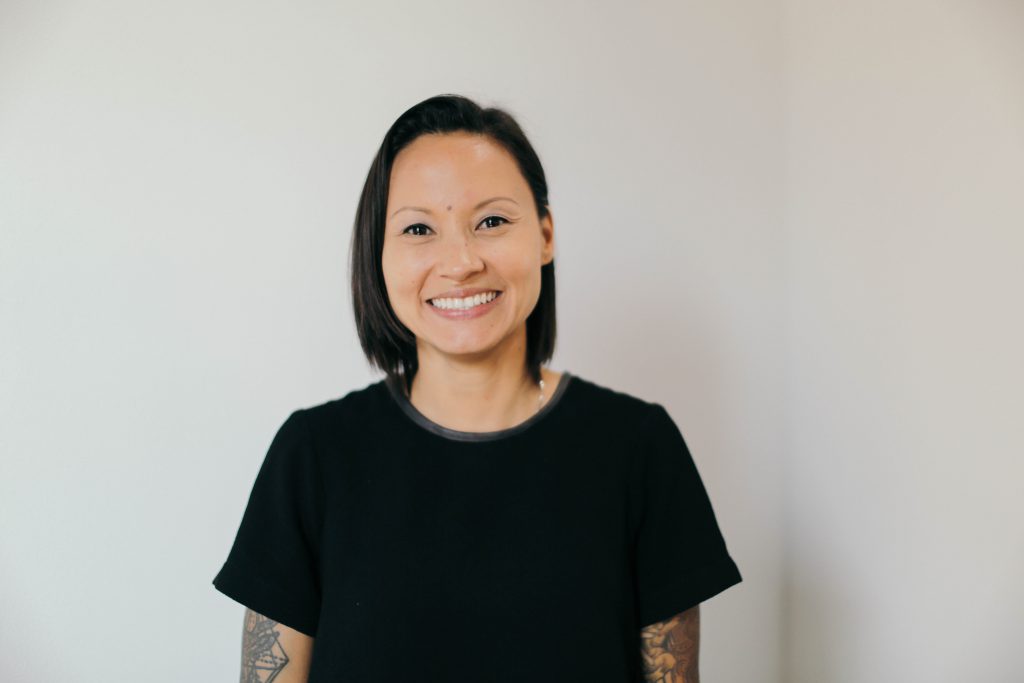
Photo by Janelle Fontana
14. CATHERINE PEREZ
Co-founder & Chief Product Officer, HealthSherpa
Sacramento, California
Catherine Perez believes that health care and access to it should not be politicized. When Healthcare.gov, the official website of the Affordable Care Act (ACA), was launched in October 2013, there were technological problems that made it difficult for the public to sign up for coverage. Driven to tackle some of the site’s consumer barriers, Perez submitted an iOS app for “a better Healthcare.gov” to the Salesforce Million Dollar Hackathon competition. She and her team took home the million-dollar prize, and shortly after, joined forces with HealthSherpa, a technology platform and a team of people helping individuals and families find, enroll in, and use high-quality, affordable health coverage.
HealthSherpa sits at the intersection of purely and unequivocally advocating for the consumer while still existing and operating as a for-profit technology company. As a double-bottom-line company, the business measures success by revenue as well as the number of people enrolled in ACA coverage and remains unbiased when making recommendations to consumers based on revenue considerations. Since its 2013 launch, HealthSherpa has enrolled more than 1.8 million people in ACA coverage, saving those folks over $3 billion collectively.
What is the most important social issue you’re addressing?
“Health insurance in our country has continued to feel more like a privilege than a right. Because of the consumer protection laws under the ACA law, our mission-driven team feels personally motivated to provide access to ACA coverage and to provide knowledge about what an ACA plan is, how much someone can save via subsidies and cost-sharing reductions, as well as any updates to policy and law (which often cause consumer confusion). We also advocate on behalf of the consumer when discussing technology and market solutions with stakeholders in the federal government at the Department of Health and Human Services.”
What role should business play in advancing racial equity?
“The ACA intended to address racial disparities and other inequities as they relate to access to health care as well as health outcomes. The work we do at HealthSherpa is directly impacted by the advancement of racial equity in health care through the ACA. Our role is inherently clear: show up for these communities by making sure we are building inclusive products, hiring diverse team members, and enforcing a value system that believes in diversity and inclusion. I would encourage leaders, investors, and others to think deeply about the following questions: How can leadership and businesses design and build the best solutions for their markets if they don’t have anyone on their teams with the lived experiences to reflect the needs of the market? It’s a fundamental moral imperative. How can you practice conscious leadership if your values only exist in a narrow and exclusive capacity? How can you truly build relationships of trust and authenticity if you aren’t genuinely invested in your people personally?”

Photo by Helena Price
15. LAURA WEIDMAN POWERS
Co-founder, Code2040
San Francisco, California
Laura Weidman Powers is thinking for the long term. Along with Tristan Walker, Powers is the co-founder of Code2040, a nationally recognized nonprofit organization whose mission is to ensure that by the year 2040 — the beginning of the decade when the majority of Americans will be people of color — Black and Latinx people will be fully represented in the innovation economy and have the economic and social capital needed to thrive and build generational wealth.
Code2040 activates, connects, and mobilizes the largest racial-equity community in tech to dismantle the structural barriers that prevent the full participation and leadership of Black and Latinx technologists. Through its events, trainings, and early-career programs, Code2040 equips underrepresented technologists and their allies with the tools, connections, and care they need to advocate for and achieve racial equity in the tech industry.
As CEO emerita (2012–2018), Powers grew Code2040 from inception to a $7 million organization that has a staff of 35, partners with more than 70 companies, and serves more than 250 students and 6,000 community members each year. In 2016, Powers was invited to join the Obama administration for a six-month term as senior advisor to US Chief Technology Officer Megan Smith. At the White House, Powers focused on ensuring that hiring practices, entrepreneurial ecosystems, and tech products and platforms of the future will work well for all Americans, particularly those from historically marginalized backgrounds.
What role should business play in advancing racial equity?
“The future of our economy and our country depends on business leaders advancing racial equity. An equitable distribution of resources and power is a prerequisite for a stable, functional democracy. People of color will be the majority in the US in little more than 20 years. Inclusion is not optional. Business leaders must dismantle exclusionary systems that maintain the status quo and oppress underrepresented groups — or these systems will be toppled when representative leadership is at the helm.”
Advice for social entrepreneurs of color:
“Starting a company is the hardest thing I’ve done, but also the most educational and one of the most meaningful. You’ll have to work harder than you thought you could, and you’ll expend unreal amounts of energy trying to get others to see the world through your eyes, but the change you can effect if you’re successful — or even by failing in the right direction — is huge.”
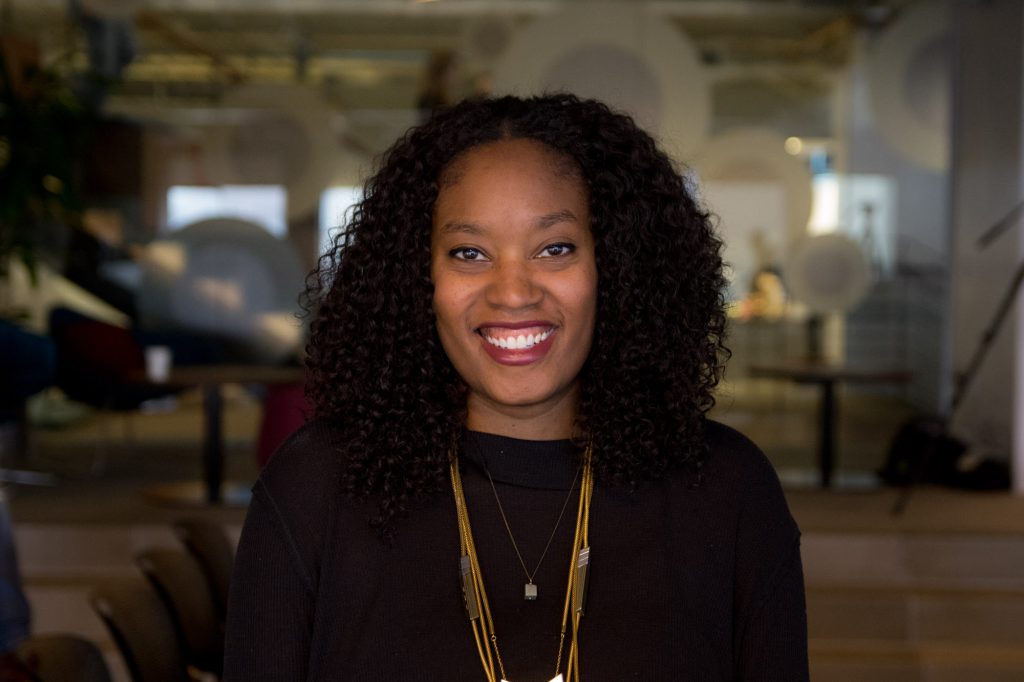
Photo courtesy of Aniyia Williams
16. ANIYIA WILLIAMS
Co-founder & CEO, Tinsel
Co-founder & Executive Director, Black & Brown Founders
Co-founder, Zebras Unite
San Francisco, California
Aniyia Williams hails from a line of entrepreneurs, but it wasn’t until she found a gap in the consumer electronics market that she started a company of her own. The classically trained opera singer grew up around her family’s school of hair design and spent her summers assisting with her grandmother’s consulting business before landing roles in marketing, business development, and fundraising at various organizations. While on a flight home from a trip on which she had been contemplating her next career move, Williams found her musical and tech worlds colliding when she decided to pursue an idea for a product that would allow her to listen to tunes on headphones without having to dig for a tangled mess of cords at the bottom of her bag. Williams and co-founder Monia Santinello launched Tinsel, an audio accessory that doubles as a beautiful piece of jewelry, in 2014.
As if pitching to investors in the hardware industry wasn’t hard enough, Williams had three additional “strikes” against her: Black; female; and, six months into building her business, pregnant. While she was excited for all the possibility that lay before her — “I was building two startups at once!” — Williams realized that the odds were stacked against her. After a residency with Code2040, a nonprofit mobilizing the largest racial-equity community in tech (see more on page 42), she co-founded Black & Brown Founders, an organization that provides Black and Latinx founders with resources and networks for starting tech companies without relying on venture capital. Williams also co-founded Zebras Unite, an active global community that is founders-first and calls for a more ethical and inclusive movement to counter existing startup and venture-capital culture.
How does bootstrapping look different for founders of color?
“Black and Latinx communities struggle with access to money, let alone capital. Cash just doesn’t flow abundantly in our communities. We don’t typically have people around us who can chip in to a friends-and-family round, we don’t typically have access to investor networks, and investors often underestimate us because we don’t fit the pattern of what they are used to seeing. But the silver lining is that many of the things that make us different are also what make us awesome founders. Despite the challenges, we often become entrepreneurs by necessity. Black and Latinx people have a resourcefulness, creativity, and grit that is unmatched.”
What role should business play in advancing racial equity?
“Technology and the innovation economy offer the greatest opportunity to create and grow wealth today, especially in diverse communities, but the barriers to entry are significant. In my opinion, the key to a thriving economic future for America is enabling tech innovation in ways that everyone can participate.”
Advice for social entrepreneurs of color:
“You deserve to be here. Your very presence is a message to those who you may never meet and who you least expect to be inspired by you and your work. Remember that your contribution to society is as valuable as someone else’s, and while it may not change the world alone, it could influence someone or something that does.”

Photo courtesy of Aydé Soto
17. AYDÉ SOTO
Co-founder & CTO, SimpleCitizen
Salt Lake City, Utah
Five years ago, Aydé Soto was living and working in Monterrey, Mexico, when she married a US citizen and discovered an opportunity to streamline the pathway to citizenship. Frustrated by her own experience with the complex US immigration system, Soto realized there was no online service to help her navigate the process, so she decided to create one of her own. Along with co-founders Sam and Brady Stoddard, Soto launched SimpleCitizen, a digital immigration and visa solution, in 2014. The company describes its service as “TurboTax for immigration,” providing a straightforward process that takes applicants from signup to completion, and has helped more than 3,000 families from more than 90 countries save at least $5 million on legal fees.
What is the most important social issue you’re addressing?
“Millions of Americans can’t gain access to attorneys and legal services to help them navigate law. Statistics show that Americans find it difficult to pay for and obtain legal services. This crisis is amplified even more for immigrants who are pressured to pay high legal fees. As the rhetoric around immigration continues to paint a dark picture for families from around the world hoping to successfully obtain a visa, green card, or citizenship, the need for SimpleCitizen increases exponentially.”
Do you have any best practices to help yourself become and embody conscious leadership?
“I take time each day to review my goals, my team’s goals, and the broader goals and objectives of the company. This has helped keep me centered and focused — and this kind of focus is contagious. It helps you stay mindful of what is important, and people notice.”
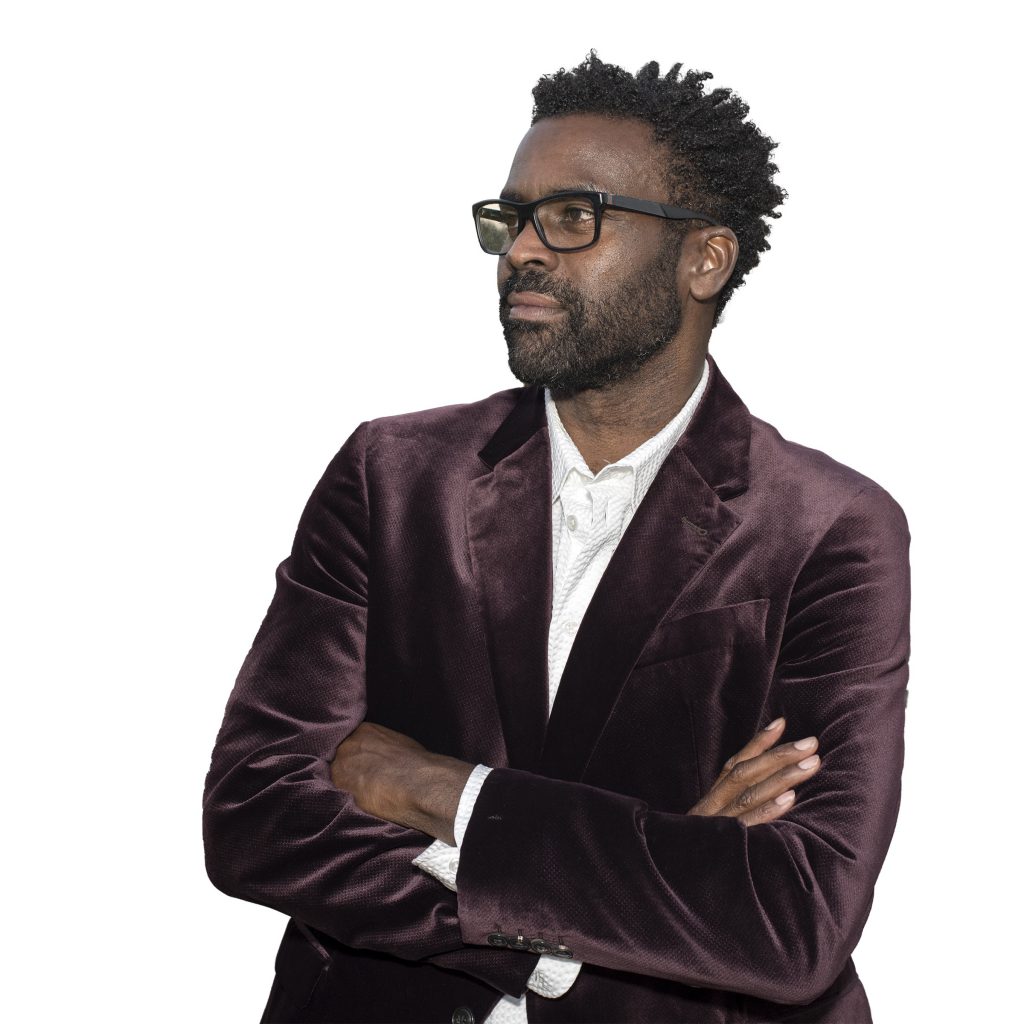
Photo courtesy of Erik Moore
18. ERIK MOORE
Founder & Managing Partner, Base Ventures
Berkeley, California
Erik Moore has seen his share of successful exits as an angel investor, including from Zappos.com (sold to Amazon for $1.2 billion in 2009), Agencourt Bioscience (sold to Beckman Coulter for $270 million in 2005), and PlanGrid (sold to Autodesk for $875 million in 2018). These early wins, along with his support of driven founders, spurred his passion for entrepreneurship. Prior to founding Base Ventures, an early-stage venture fund, Moore spent nearly 15 years in investment banking at Merrill Lynch, where he was among the top performers in fixed-income institutional sales. He then co-founded FlickLaunch, a digital streaming platform on Facebook for feature-length movies, and RuleLX, a successful special-purpose investment vehicle that offered a unique, discreet investment opportunity. Base Ventures builds upon the success of RuleLX by scaling Moore’s access to many of the best deals in Silicon Valley. For nearly 10 years, Moore has invested alongside leading venture capitalists, including NEA, Bain Capital, GV, Andreessen Horowitz, and Sequoia.
In addition to investing in exceptional founders, Moore also strives to give back to his community. He has served organizations such as The Common Ground Foundation (founded by Grammy, Oscar, and Emmy award-winning artist Common); PACE, a private philanthropic group; the Museum of the African Diaspora, a Smithsonian affiliate; Russell Simmons’ Art for Life; the East Bay College Fund; and on the boards of several Base Ventures portfolio companies.
What makes an exceptional founder?
“They are resilient. Building a business takes hard work. Founders with a history of overcoming adversity, professionally and personally, are uniquely able to push through difficult times. They are singularly focused and must exhibit a clear passion for their businesses. It informs how they are able to innovate through the ebbs and flows of building a business. And they are resourceful. How do they overcome and develop creative solutions to the inevitable challenges that arise?”
What gives you hope for the future?
“When I attended my first South by Southwest technology conference almost 10 years ago, it was impossible to find 14 other people of color in attendance. Fast-forward to 2018, and one of our portfolio companies, Blavity, founded by powerhouse Morgan DeBaun, runs a tech conference called AfroTech. Their conference hosted 4,000 people of color in San Francisco a few months ago. Things have changed considerably, and it has made the entire ecosystem that much better and more robust. DeBaun and other entrepreneurs like her give me tremendous hope for the future.”
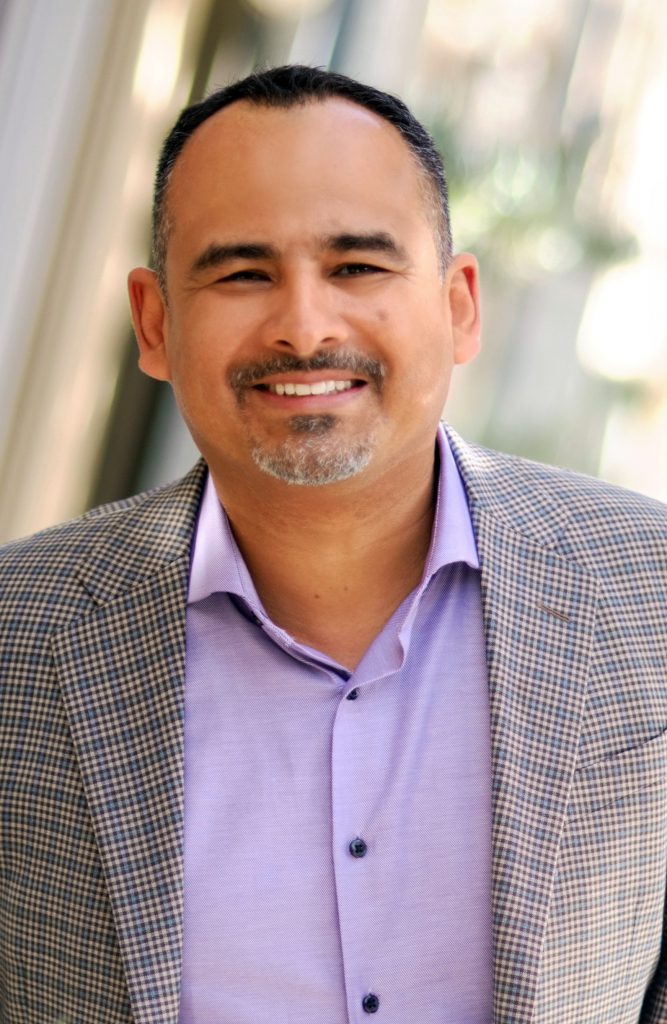
Photo courtesy of Oscar Gomez
19. OSCAR GOMEZ
Founder & Principal, SoJoGo
San Francisco, California
A first-generation Mexican-American, Oscar Gomez was the first of his family to attend college. Reflecting, Gomez realizes that his education and experience in equity, diversity, and inclusion (EDI) truly began while earning his degree in international studies as one of the few Latinx students on Pepperdine University’s Malibu campus. His first job out of school was for a small nonprofit organization that worked on equity issues for migrant and seasonal farmworkers along the East Coast, and he’s been immersed in EDI issues ever since. After spending 25 years working in the community health field, 16 of which were as CEO of a national nonprofit, Gomez decided to move on to discover his next passion in life and circled back to EDI. In 2018, he launched SoJoGo, a company that partners and consults with purpose-driven organizations to deepen the impact of their EDI initiatives. The three syllables of the company’s name serve as tribute to his roots and his earliest inspiration, his parents Socorro and Jose Gomez.
What role should business play in advancing racial equity?
“To me, the whole Nike-Kaepernick advertising campaign provides an irrefutable business case for bringing a racial-equity lens and overall social consciousness to executive meetings and corporate board rooms. I’m sure those were incredibly difficult and challenging discussions within Nike headquarters. But in the end, it seems that Nike carefully looked at all the data about who its customer base would be for the next 30 years. As time goes on, this advertising campaign will seem less like a bold, strategic risk and more like smart, forward-thinking business. How can you argue against that decision when, within one month, Nike reported a record stock value to the tune of $6 billion, and Colin Kaepernick emerged as a civil rights leader and icon?”
Advice for social entrepreneurs of color:
“Seek out and build relationships with other leaders and entrepreneurs of color. Co-create mutually supportive spaces that promote vulnerability, empathy, and a sense of community. At the risk of sounding cliché, can lead to some powerful conversations and insights with a bit of healing in the process. Be intentional in seeking out diverse leaders of color — by gender identity, race/ethnic background, sexual orientation, and age — for those relationships. Explore, observe, and discuss the additional lenses through which you each experience your work and your intended social impact.”

Photo courtesy of Kreyòl Essence
20. YVE-CAR MOMPEROUSSE
Founder & CEO, Kreyòl Essence
Norfolk, Virginia
A Haitian-American, Yve-Car Momperousse grew up using her mother’s supply of Haitian black castor oil to keep her hair and skin healthy, but as she got older she realized there was no way to get the oil in the US. Recognizing a gap in the market and an opportunity to empower women, Momperousse founded Kreyòl Essence, a company that makes natural and ethical beauty products and supports female suppliers of castor oil in Haiti. The thriving enterprise has products on shelves at mainstream retailers like Whole Foods and is lauded as a beauty-industry leader by Sephora. She has created work for more than 3,000 farmers and 80 female castor-oil producers, and has seen a 600 percent increase in sales in the last year alone.
What role should business play in advancing racial equity?
“The Millennial generation is the most diverse in US history, and in 2050 we will live in a minority-majority country. Inclusivity is not simply a moral imperative; it’s a business imperative.”
Advice for social entrepreneurs of color:
“It’s a great time to be in business as the ecosystem is realizing that our voice and perspective is needed. Enter the room with confidence knowing you have an advantage. It’s what I call ‘cultural fluency.’ We people of color often have the gift of understanding what our community needs in addition to ‘mainstream’ communities.
If your business model caters to diverse audiences, own it and be proud. The fallacy that doing so makes you a niche company is being dispelled. Walker & Company, Carol’s Daughter, and Sundial Brands — Shea Moisture is under Sundial — have all sold to Unilever, L’Oréal, and Procter & Gamble, focusing on women of color. Don’t let anyone pigeonhole you. If you don’t want to solely focus on diverse communities, that’s okay, too.”
HEAR Momperousse on the World-Changing Women Podcast.
Interested in continuing the conversation on racial equity? Make sure to attend SPECTRUM, the premier gathering of multicultural changemakers creating an inclusive impact economy, June 12-13, 2019 at The Gathering Spot in Atlanta, GA.
